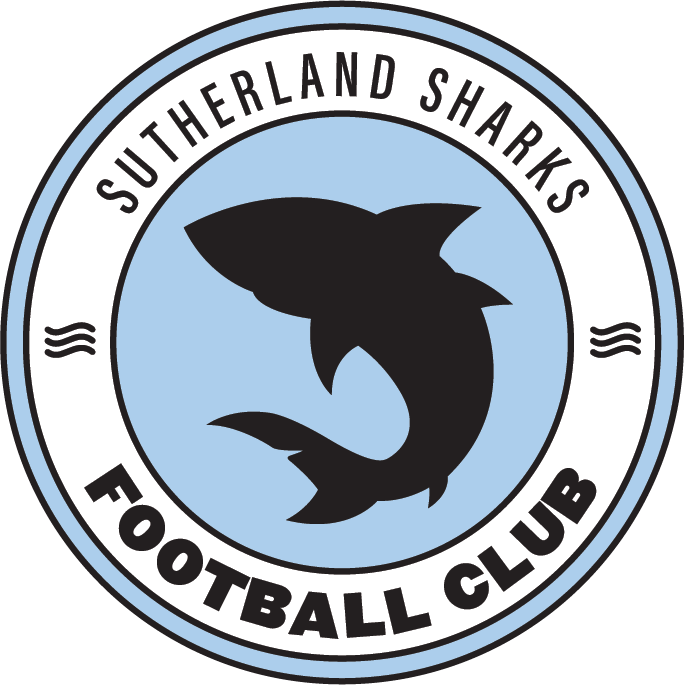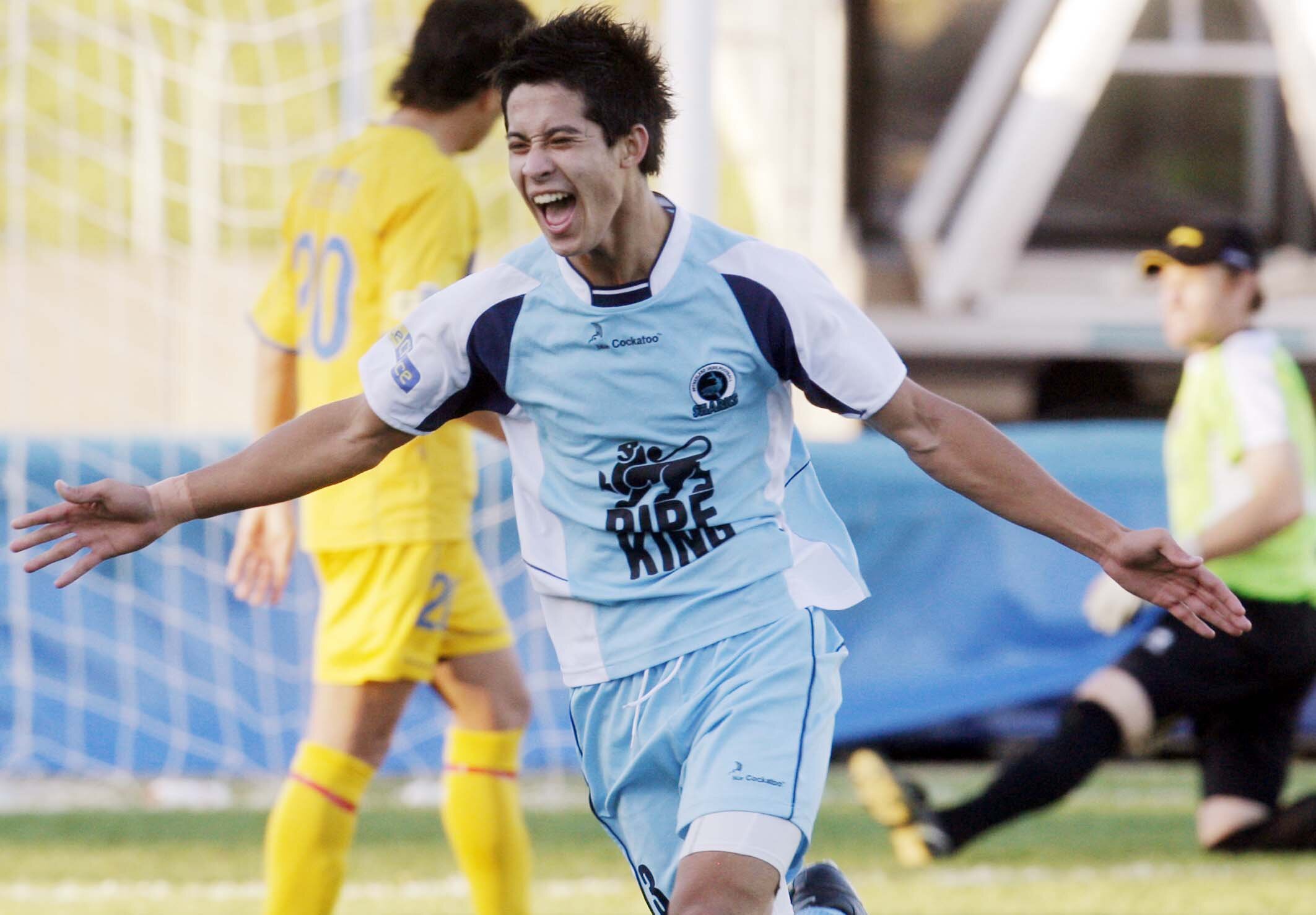The origins of Sutherland Sharks are traced back to the founding of Sutherland United SFC in 1930. By 1936, the club had grown markedly leading to a split and formation of the current-day club, albeit under a different name – Casuals Soccer Football Club. In the post-WWII era, the club grew and found success in the St George Football Association but in 1947 they stepped up to the Metropolitan Soccer League (effectively the Sydney 2nd Division, behind only the old NSW Soccer Association 1st Division). The club soon earned its stripes in this highly competitive league winning the title in just their second year and gaining promotion to the heady heights of the 1st Division but disappointingly, financial constraints forced them to let the opportunity pass. It was another 24 years before the club moved into the top flight state league.
In 1949 the club changed its name to the more representative Sutherland Shire Casuals SFC, and in 1950 the club acquired a long-term lease on the Seymour Shaw field. However the club did not move permanently to the Miranda ground until 1959, continuing to use Sutherland Oval. In 1955, the club again changed its name to Sutherland Shire Soccer Football Club.
During the following decade, the club further consolidated its position in the local community. In 1961 it amalgamated with the ailing St George district club (a separate entity to the later St George Budapest) and for a brief period became ‘Sutherland – St George SFC’ before reverting back to its original name a couple of years later. 1961 was also notable for the staging of a curious ‘International’ fixture at Seymour Shaw Park when the locals took on the Fiji National Team. Former Club President and current General Manager, George Hurley played for Sutherland in this match. The Fijians ran out 5-3 winners before an estimated 4,000 spectators.
In 1966 the club was granted a liquor license and duly opened a social club on the southern side of the ‘Fiveways’ at Miranda. Following early success the social club was forced to shut its doors for the final time in the mid 80’s due to financial constraints.
The Seventies proved a prosperous decade for the club. In 1971, under the tutelage of Mike Johnson they won the 2nd Division (now Division 1), thus securing the long awaited promotion to the top league in NSW soccer. Incidentally the club has not been relegated since giving them the longest concurrent Super League term of any club.
The first few years in Division 1 were tough, with the club finishing near the bottom of the ladder each year until 1977 when they reached the semi finals for the first time. In the following year, they won a major trophy for the first time when they claimed the prestigious Ampol Cup. Just to prove this was no fluke, later that year Sutherland defeated Sydney Croatia 2-1 in a replayed Grand Final at Wentworth Park to clam a remarkable double.
This began a long period of success for the club based almost entirely on homegrown talent, a policy which has been fostered by the club to the present day.
The club were perennial semi finalists throughout the late 70’s and 80’s, during which time they again won the Ampol Cup (1981) and also achieved another Grand Final success memorably coming from behind to secure a 3-1 win against Melita Eagles at St George Stadium (1986).
In 1984, the NSL was to be expanded by the addition of four Sydney clubs, with Sutherland tipped to secure the fourth and final berth. In perhaps the greatest disappointment of this period, the club was edged out of contention by the newly formed Penrith City, who failed to live up to expectations and folded two years later when relegated from the NSL.
In 1988, the Sharks, in what was quite a coup, hosted a friendly with the Socceroos in a warm up for the Bicentennial Gold Cup drawing what is generally considered a ground record of 4,500 spectators.
Blair Brown in action against the Wolves
Sharks celebrating the 2009 Grand Final win over Marconi 4-1 at Penrith’s CUA Stadium.
Brendan Gan scores again for the Sharks
Whilst the 90’s have seen some disappointing seasons, the club has nevertheless recorded its first ever minor premiership in 1991, and followed this up with a repeat victory in 1996. 1996 also saw major improvements being carried out to Seymour Shaw, including the long awaited building of a 650 seat grandstand with all weather protection, corporate boxes and modern facilities.
After staving off relegation for a few seasons the club was relegated for the first time in its long history in 2002. This saw a change in the committee backed by Major sponsor John Hills (PIPE KING) with an improvement on and off the field and in 2006 a bold bid to enter the new 10 team elite Premier League was succesful.
The Sharks began to build a formidable outfit and narrowly missed the semi-finals in 2007 but won the reintroduced Leader Challenge Cup against St George. In 2008 the club raised a few eyebrows when they when they won the NSW Premier League Championship (Minor Premiership) and lost the Grand final in a hard fought game to Wollongong. Again the sharks successfully beat St George to retain the Challenge Cup.
The ground record was broken in 2008 when over 5000 spectators crammed into Seymour Shaw to watch the Sharks take on the high flying “A” League side Sydney FC in a friendly. In a great exhibition the Sharks came away 1-0 winners.
In 2009 under coach Robbie Stanton the club swept all before it winning firstly the prestigious NSW Tiger Cup, Leader Challenge Cup, and became Premiers beating Marconi 4-1 in the Grand final at Penrith's CUA stadium. The club had re-established itself as a powerhouse in State Football.
The past 80 years has seen many changes with both success and disappointment to the Sharks, but all involved with the club are positive the local spirit and pride will herald continued success well into the new millennium.




